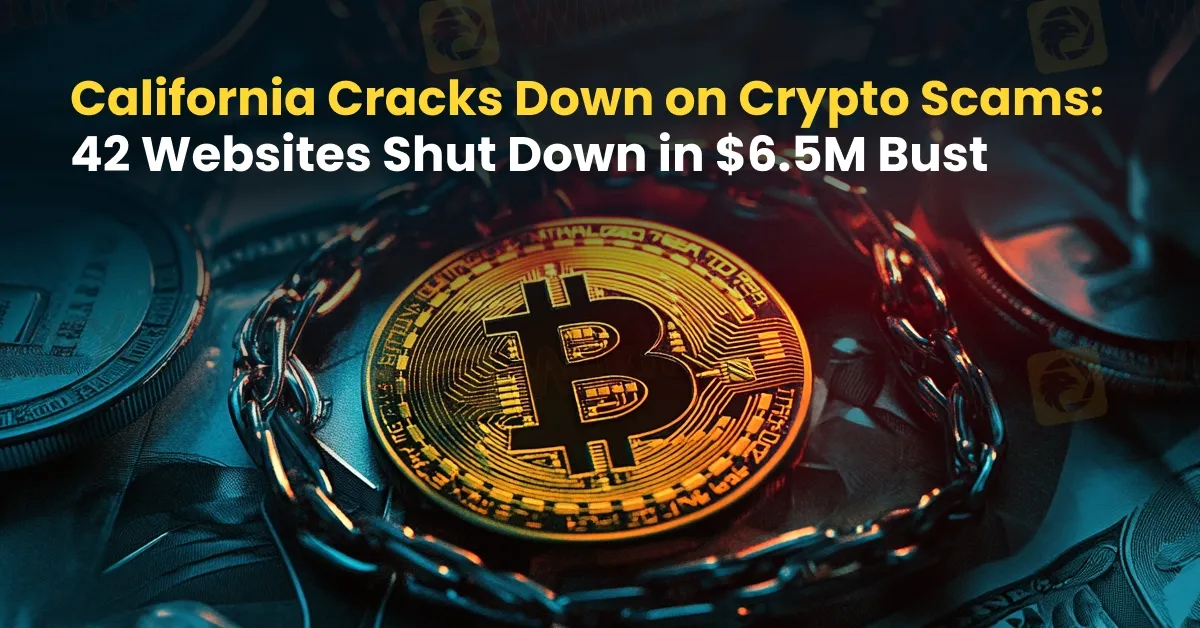California Cracks Down on Crypto Scams: 42 Websites Shut Down in $6.5M Bust
Abstract:California Attorney General Rob Bonta announced earlier this week that the state had taken decisive action against fraudulent cryptocurrency operations. Authorities successfully shut down 42 scam websites responsible for deceiving investors out of at least $6.5 million.

California Attorney General Rob Bonta announced earlier this week that the state had taken decisive action against fraudulent cryptocurrency operations. Authorities successfully shut down 42 scam websites responsible for deceiving investors out of at least $6.5 million.
An investigation by the California Department of Justice (DOJ) revealed that these fraudulent websites primarily engaged in so-called “pig-butchering” scams. This method involves scammers cultivating trust with victims over extended periods, often through social media or unsolicited messages. Once a connection is established, the fraudsters persuade victims to invest in fake cryptocurrency platforms that falsely display substantial returns. Encouraged by these fabricated gains, victims often increase their investments, only to discover that their funds are unrecoverable when they attempt withdrawals.
The financial impact of these scams has been severe, with the average victim losing approximately $146,306. Authorities emphasize that such schemes rely on both deception and emotional manipulation, making it imperative for consumers to remain vigilant when engaging in online investments.
The Department of Financial Protection and Innovation (DFPI) has played a critical role in educating consumers about emerging crypto scams. Commissioner KC Mohseni reaffirmed the agency‘s commitment to increasing public awareness, highlighting the importance of tools like the DFPI’s Crypto Scam Tracker, which helps individuals identify potential threats. The DFPI has also outlined ten key warning signs of fraudulent activity, including unrealistic investment promises, lack of verifiable contact details, plagiarized website content, and high-pressure sales tactics.

In addition to recognizing red flags, regulatory authorities strongly encourage individuals to verify the legitimacy of investment platforms before engaging in financial transactions. Websites that falsely claim regulatory approval or request sensitive financial information without proper verification should be treated with caution.
Before engaging with any online investment platform, individuals must conduct thorough due diligence. Verifying website authenticity is crucial, as fraudulent platforms often mimic legitimate ones to deceive investors. Checking domain registrations, company licensing, and regulatory approvals can help identify potential scams. Engaging only with well-established cryptocurrency exchanges with strong security protocols further reduces the risk of financial loss.
Avoiding unsolicited investment offers is also essential. Scammers frequently initiate contact through social media or text messages, offering lucrative opportunities that seem too good to be true. Regulatory warnings should always be monitored, as financial authorities regularly publish alerts about known fraudulent schemes. Finally, reporting any suspicious activity to law enforcement ensures that fraudulent operations are dismantled before they claim more victims.

When in doubt, download the free WikiFX mobile application to avoid falling victim to schemes like these. WikiFX provides detailed information on brokers, including regulatory status, customer reviews, and safety ratings, allowing users to verify the legitimacy of any investment platform before committing their money. With access to in-depth insights and risk alerts, WikiFX equips potential investors with the resources to make informed decisions and avoid unauthorized or unlicensed entities. By checking with WikiFX, users can confidently protect their savings and avoid the costly traps set by unscrupulous investment syndicates.
You have nothing to lose and everything to gain.

Read more

TriumphFX Rebrands to Continue Global Fraud: Over RM80 Million Lost
The notorious forex investment company TriumphFX, previously exposed for running a global scam operation for over a decade, is now being accused of rebranding itself to continue defrauding unsuspecting investors. Despite being unregulated and based offshore in Seychelles, TriumphFX has actively targeted Malaysian investors, luring them with false promises and eventually converting funds into cryptocurrency, making recovery nearly impossible.

TriumphFX Faces 29 Exposure Reviews on WikiFX
TriumphFX faces scrutiny with 29 exposure reviews on WikiFX, revealing regulatory warnings from ID BAPPEBTI, VU VFSC, SG MAS, and MY SCM, plus user complaints about withdrawal issues and fraud concerns.

What WikiFX Found When It Looked Into Exclusive Markets
In the fast-growing world of online trading, security and regulation are essential. One company now raising questions in this space is Exclusive Markets, a broker claiming to be regulated, but scrutiny of its licence and operations suggests a more complex picture.

TriumphFX Review 2025: A Safe Bet or a Risky Trap?
Is TriumphFX a trustworthy broker or a scam in 2025? This review explores its regulation, withdrawal issues, and more to help you decide if it's a safe bet or a risky trap.
WikiFX Broker
Latest News
How much money will you earn by investing in Vantage Broker?
IronFX vs Exness Review 2025: Comprehensive Broker Comparison
Fraudsters Are Targeting Interactive Brokers' Users with Lookalike Emails
Everything you need to know about ADSS
SkyLine Guide 2025 Malaysia: 100 Esteemed Judges Successfully Assembled
Vantage Markets Review 2025: Trusted Forex and CFD Trading Since 2009
Top Tips to Choose the Best Forex Broker in 2025
SEBI Notifies New F&O Rules for Investors - New Derivative Trading Limits & More Amendments
Interactive Brokers: Global Office Visits and Licensing Details
U.S. Jobs Data Released: A Potential Boost for Gold Prices
Rate Calc
